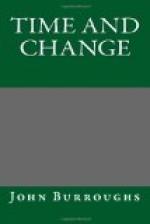I would rather see the girls in the fields and woods studying and enjoying living nature, training their eyes to see correctly and their hearts to respond intelligently. What is knowledge without enjoyment, without love? It is sympathy, appreciation, emotional experience, which refine and elevate and breathe into exact knowledge the breath of life. My own interest is in living nature as it moves and flourishes about me winter and summer.
I know it is one thing to go forth as a nature-lover, and quite another to go forth in a spirit of cold, calculating, exact science. I call myself a nature-lover and not a scientific naturalist. All that science has to tell me is welcome, is, indeed, eagerly sought for. I must know as well as feel. I am not merely contented, like Wordsworth’s poet, to enjoy what others understand. I must understand also; but above all things I must enjoy. How much of my enjoyment springs from my knowledge I do not know. The joy of knowing is very great; the delight of picking up the threads of meaning here and there, and following them through the maze of confusing facts, I know well. When I hear the woodpecker drumming on a dry limb in spring or the grouse drumming in the woods, and know what it is all for, why, that knowledge, I suppose, is part of my enjoyment. The other part is the associations that those sounds call up as voicing the arrival of spring: they are the drums that lead the joyous procession.
To enjoy understandingly, that, I fancy, is the great thing to be desired. When I see the large ichneumon-fly, Thalessa, making a loop over her back with her long ovipositor and drilling a hole in the trunk of a tree, I do not fully appreciate the spectacle till I know she is feeling for the burrow of a tree-borer, Tremex, upon the larvae of which her own young feed. She must survey her territory like an oil-digger and calculate where she is likely to strike oil, which in her case is the burrow of her host Tremex. There is a vast series of facts in natural history like this that are of little interest until we understand them. They are like the outside of a book which may attract us, but which can mean little to us until we have opened and perused its pages.
The nature-lover is not looking for mere facts, but for meanings, for something he can translate into the terms of his own life. He wants facts, but significant facts—luminous facts that throw light upon the ways of animate and inanimate nature. A bird picking up crumbs from my window-sill does not mean much to me. It is a pleasing sight and touches a tender cord, but it does not add much to my knowledge of bird-life. But when I see a bird pecking and fluttering angrily at my window-pane, as I now and then do in spring, apparently under violent pressure to get in, I am witnessing a significant comedy in bird-life, one that illustrates the limits of animal instinct. The bird takes its own reflected image in the glass for a hated rival, and is bent on demolishing it. Let the assaulting bird get a glimpse of the inside of the empty room through a broken pane, and it is none the wiser; it returns to the assault as vigorously as ever.




